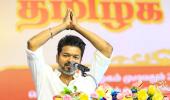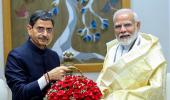Tamil Nadu Deputy Chief Minister Udhayanidhi Stalin has reacted to Andhra Pradesh counterpart Pawan Kalyan's out-of-turn taunts with a one-liner, 'Let's wait', and thereby hangs a tale, explains N Sathiya Moorthy.

Once bitten twice shy. Or, is it?
Possibly chastised, or at least not wanting to be drawn into an avoidable controversy after the Supreme Court ticked him off the last time round, Tamil Nadu Deputy Chief Minister Udhayanidhi Stalin has reacted to Andhra Pradesh counterpart Pawan Kalyan's out-of-turn provocative statements with a one-liner, 'Let's wait.'
The fact of the matter is that actor-politician and Janasena Party founder Pawan Kalyan is caught in a one-upmanship Hindutva competition with his TDP Chief Minister Nara Chandrababu Naidu after the latter pulled out the Tirupati ladoo issue as a stick to beat YSR Congress rival and predecessor Y S Jagmohan Reddy, giving a religious touch to what should have ended up as a corruption charge at best.
Having entered what became a Hindutva one-upmanship show between Naidu and his BJP electoral allies, at the Centre and in the state, Pawan Kalyan seemed to have transited to the Sanatan Dharma row after the Supreme Court ticked off Naidu and his government for kick-starting a religious dispute, especially when there was nothing on record to show that the ghee that went into the preparation of the famed Balaji temple ladoos in Tirupati was contaminated by animal fats under rival Reddy's regime and linking it to the latter's Christian background.
What was originally seen as competitive politics between Naidu and Reddy took a new hue when the BJP ally made strong statements on 'ghee contamination'.
The issue then became competitive Hindutva politics between the TDP with its possible national ambitions and the BJP that was already there, heading the NDA government at the Centre, for ten long years under Prime Minister Narendra D Modi.

As a wag put it, 'From a regional perspective, Ayodhya was/is mostly a north Indian controversy. In the southern states of Tamil Nadu and Kerala, the BJP had the forgotten 'Sri Andal row' and 'Vetri Vel Yatra', both centred on local believes in the former, and the unforgettable controversy and court cases on allowing women to the Sabarimala temple of Lord Ayyappan.
In Telugu land, there was none of the kind through the past decade and more, especially when Naidu and Reddy were competing to be seen as 'more secular than the other'.
Now, the former as chief minister has changed his tactics and targeted constituencies.
Naidu seems to have given up on his secular credentials after hobnobbing with a succession of BJP-RSS prime ministers, first Atal Bihari Vajpayee two-plus decades ago and now Modi, beginning circa 2024.
His idea is to upstage the Hindutva BJP at least in native Andhra and take back the Telugu votes that had gone the saffron way, asap, if only to secure the state for son Nara Lokesh, a minister in his cabinet.

According to reports, Pawan Kalyan, an electoral ally of the TDP along with the BJP, is peeved at Naidu promoting his son as his chief ministerial successor to the detriment of his Janasena Party's political/electoral interests.
Since Naidu returned to power after the assembly elections earlier this year, both traditional and social media reports have been talking about the choice of young ministers and officials all-round aimed at nurturing Nara's political future.
For all practical purposes, Nara Lokesh is acting as the CM and his father has slowed down the pace of work and politics -- or so goes some observations.
In contrast, Pawan Kalyan, who is in charge of rural development, including water supply and panchayat raj, is often discouraged to stay in contact with the people.
In particular, there were reports that the deputy CM was advised to stay at home and not get involved in post-floods relief work in the state last month, with claims that large crowds coming to see him would hamper officials's work. The Pawan camp is not said to be happy about such propositions, and naturally so.

This apart, Pawan Kalyan's Kapu community sees him as the only hope for them to claim the chief minister's job for a long, long, time to come, against the previous choices from either Naidu's Kamma community or the powerful Reddy community.
By promoting Nara Lokesh and stymieing his own growth prospects of the kind, his party, community, Naidu was working to make him an understudy of the former too -- or, so seems to be the thinking of the Janasena camp. Pawan Kalyan hence seemed wanting to send out a message to Naidu and his aides.
In this, the ladoo controversy, post-floods, came in handy. But before Pawan Kalyan could gather his thoughts and say 'ghee', the Supreme Court had clamped silence on the issue, pending the ongoing proceedings at the very least. Yet, it was a Hindutva moment that the Janasena leader could not sacrifice, after getting a hang of it.
Reviving the non-existent Sanatan Dharma dispute fitted his immediate need, so what if it did not have a local Andhra-centric appeal. However, like the ladoo issue, Sanatan Dharma had a national constituency, especially after Modi, his deputy Amit A Shah and a host of BJP national leaders joined the issue with Udhayanidhi Stalin since September last year.
Because the Supreme Court had told off Udhayanidhi, that as a minister he should have thought of the consequences of his public uttering on Sanatan Dharma, Pawan Kalyan seems to have concluded that the DMK leader was fair game.
Of course, Udhaya at that stage before the Supreme Court had only sought directions for all cases filed against him in different BJP-ruled states to be heard at one and the same place. The status of the case remains the same to date.
It is also necessary to remember that the Supreme Court's comments were not contained in any written order, but were only oral observations that had no legal binding.
Against this background, the real message of how and when Pawan Kalyan said what he said, rather than the content, were addressed to his own state, people and politics, that too coalition politics of the present kind.
In an actor-politician who had not talked Hindutva even during the twin poll campaigns to the Lok Sabha and Andhra assembly, this overnight costume change into saffron and launching a long march again overnight, all of it looks cinematic, not even dramatic.
Not that Naidu was any less so, considering the way he went out pitching a possible corruption and food adulteration case against Jagan Reddy into a fight for beliefs and religion -- going as far as to shutting down the famed Tirupati temple and having priests perform purifying rites, or samprokshanam, where none might have been called for.

As if continuing to play it all out as BJP's B-Team still, Tamil Nadu Governor R N Ravi has since added to the Hindutva row one more time, by declaring that Sanatan Dharma was against castes.
However, he had no explanation to offer when social media posts contested him, claiming that the Manu Smriti had codified castes and caste-differences and also specified penalties, both temporal and beyond.
Significantly again, no senior DMK leader joined issues with Ravi either. After five electoral defeats in a row, the otherwise divided Dravidian polity seems convinced that the BJP's Hindutva card does not sell in Tamil Nadu, and there was no need to propagate their theories by contesting the same -- or, so it seems.
Those electoral defeats comprised two during the time of rival AIADMK boss Jayalalithaa's life-time in 2014 (lok Sabha) and 2016 (assembly), followed by three others favouring the DMK alliance (2019 and 2024: Lok Sabha, and 2021: Assembly).
However, on the Pawan Kalyan row especially, statements did appear in the names of some faceless organisations like the Tamil Nadu Non-Brahmin Temple Priests Associations and Women Temple Priests Association, pointing out how under the Sanatan model, they stood no chance, and how they owed their present elevation to the likes of Periyar and Ambedkar.
While they do not want to misdirect the continuing socio-political discourse in the state back to Hindutva during the long run-up to the 2026 assembly elections, when anti-incumbency will be a factor, they do not rule out provocations of the kind, coming from the other side.
Some of it, they say, they should expect from the BJP rival, some from the likes of Governor Ravi, and now those in Pawan Kalyan's mode, the 'neo-converts' with a stand-alone politico-electoral motive.
To them, however, last year's poll-eve controversy kicked up by top-rung BJP leaders including Modi, Shah and Rajnath Singh, may have only 'marketed' Udhayanidhi's name and face even to the remotest corners of the country, which his father Stalin, with nearly five decades of politics behind him, cannot boast of.
So were the SC's obiter dicta, in a way. Neither affected elections in Tamil Nadu -- but that should not mean they have to say things in the name of 'social justice', which anyway is acknowledged in their doings, especially when in government.
Otherwise, the ladoo controversy and Pawan Kalyan's tactical outpouring have exposed another element of political Hindutva that the BJP might not have considered while taking up the issue through its multiple facets over the past decades.
Of them, the former especially is centred on issues and beliefs, real and otherwise, where an identified section of the nation's electorate cannot relate to the BJP, as with the Ayodhya dispute or Article 370 or uniform civil code.
Time for the BJP then to go back to the blackboard, did you say?
N Sathiya Moorthy, veteran journalist and author, is a Chennai-based policy analyst and political commentator.
Feature Presentation: Rajesh Alva/Rediff.com











 © 2025
© 2025